News
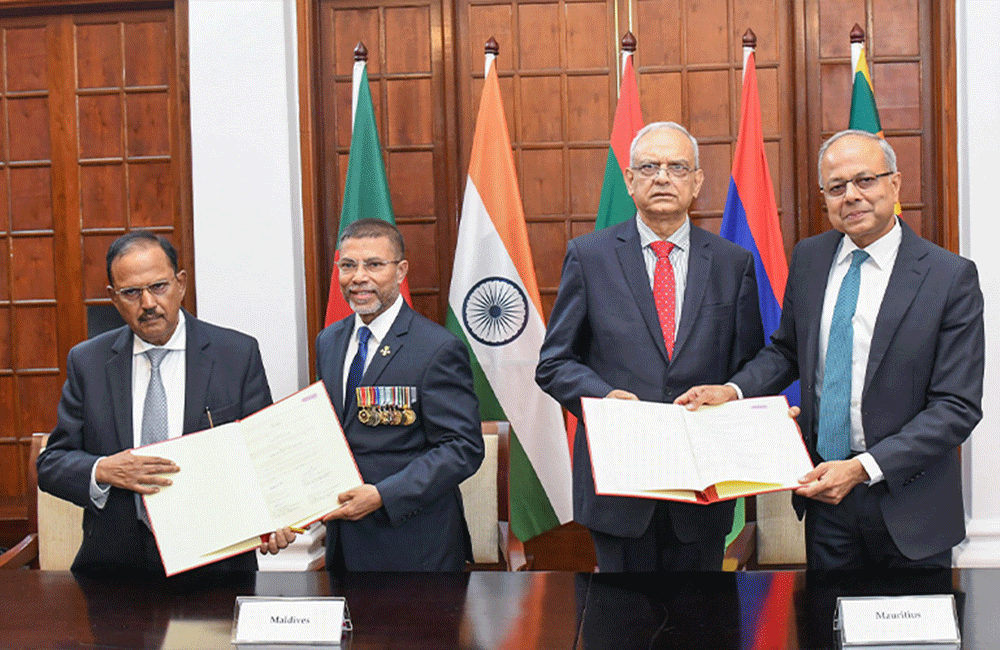
President Meets Indian National Security Advisor Ajit Doval
A crucial meeting between Indian National Security Advisor Mr. Ajit Doval and President Ranil Wickremesinghe unfolded this morning at the Presidential Secretariat in Colombo. The discussions centred around enhancing economic cooperation, strengthening defence ties, and fostering regional collaboration between the two neighbouring nations.
The meeting underscored the importance of the strategic partnership between India and Sri Lanka, exploring avenues to deepen economic engagement and fortify defence cooperation. The dialogue also touched on broader regional issues, reflecting the shared interests and common challenges faced by the two countries in maintaining stability and security in South Asia.
Chief of Staff to the President and Senior Advisor on National Security Sagala Ratnayaka, also attended the meeting, contributing to the discussions that are expected to further solidify the relationship between India and Sri Lanka.
Meanwhile, the Member States of the Colombo Security Conclave (CSC) – Sri Lanka, India, Maldives, and Mauritius signed the Charter and Memorandum of Understanding (MoU) for the establishment of the CSC Secretariat this afternoon (30) at the Presidential Secretariat.
Indian National Security Advisor Mr Ajit Doval K C; National Security Advisor of Maldives Mr. Ibrahim Latheef, DC (Retd.), Lt Col (Retd.); High Commissioner of the Republic of Mauritius to Sri Lanka H.E. Haymandoyal Dillum, and Senior Advisor to the President on National Security of Sri Lanka Mr. Sagala Ratnayaka, signed the documents on behalf of the respective Member States.
Addressing the ceremony, Senior Advisor to the President on National Security of Sri Lanka Mr. Sagala Ratnayaka emphasized that the scope of national security now extends beyond external threats to include the management of internal challenges arising from technological advancements. He highlighted the need for governments to take more practical approaches in addressing the negative effects of freedom of expression in the current digital age, while recognizing it as a fundamental right.
The CSC s core objective is to promote regional security by addressing transnational threats and challenges of common concern to the Member States. There are five pillars of cooperation under the CSC namely Maritime Safety and Security; Countering Terrorism and Radicalisation; Combating Trafficking and Transnational Organised Crime; Cyber Security and Protection of Critical Infrastructure and Technology; and Humanitarian Assistance and Disaster Relief.
Addressing the gathering Mr. Sagala Ratnayaka further elaborated:
It is with great pleasure that I welcome our esteemed colleagues and delegations to Sri Lanka for the momentous occasion of signing the founding documents of the Colombo Security Conclave. Today, we gather in Colombo, united by our shared commitment to regional security and cooperation. This historic event offers us yet another opportunity to deepen our formal commitment to the principles of this esteemed Conclave upholding a common strategic vision, emphasizing the importance of resisting escalating external influences in the region, and fostering collaboration while averting conflicts with neighbouring countries.
Since its inception in 2011, the Colombo Security Conclave, originally established as trilateral maritime security cooperation between India, the Maldives, and Sri Lanka, has successfully navigated through numerous challenges and achieved significant progress. We are now fortunate to have Mauritius and Bangladesh as active members, with the Seychelles invited to join as well. The unwavering cooperation among our member states is a testament to our resilience in adversity and our dedication to maintaining peace in the region.
Sri Lanka is honoured to host this event, particularly as the home to the permanent Secretariat of the Colombo Security Conclave. This demonstrates our commitment to addressing the complex security challenges that impact us all. Our collective dedication to the five fundamental pillars and objectives of the Conclave will be instrumental in shaping a future where peace, stability, and prosperity are not just aspirations, but realities.
In a rapidly changing world with evolving threats, our efforts must focus on strengthening regional partnerships, sharing intelligence, and developing collaborative strategies. It is imperative that we address traditional security concerns while confronting emerging threats that transcend borders, such as cyber security, transnational crime, and maritime security.
Moreover, I want to touch upon the recent experiences of Sri Lanka, a country that has just emerged from an economic crisis. During this period, we witnessed weeks of violence in the streets of Colombo, and Bangladesh has also faced its own challenges. Sri Lanka has a deeply ingrained social welfare system, with successive governments committed to serving the people. However, over time, financing these welfare programs became increasingly difficult, leading to unsustainable borrowing. This culminated in a government that made election promises to reduce taxes and implement a 100% chemical-free agriculture policy. These promises were delivered, but the consequences were dire, leading to a financial crisis where the government struggled to service loans and fund day-to-day activities. The situation escalated to the point of printing money, ultimately resulting in unrest and uprisings, fuelled by the rapid dissemination of information through technology.
National security now extends beyond external threats to include the internal challenges posed by technological advancements and the management of such advancements. While freedom of expression is a fundamental right, managing its impact in the digital age is a delicate balance that governments must navigate.
As we move forward, it is crucial that we share our experiences and insights to develop solutions that are both innovative and practical. By leveraging our collective expertise, we can build a sustainable framework that supports security and fosters deeper regional integration.
I urge you to seize this opportunity to strengthen our commitment to securing a prosperous future, forging stronger bonds that will lead us into a future defined by mutual respect and collaboration for the benefit of our peoples.
I would like to extend my sincere thanks to everyone involved in organizing this event in such a short time. The efforts of the foreign ministers, the Foreign Secretary, the Office of the National Security Advisor, the Colombo Security Conclave Secretariat, the various missions, and the respective governments have been remarkable. The swift approvals and coordination are unheard of in this part of the world, and I am deeply grateful to all.
Following the ceremony, Indian National Security Advisor Mr Ajit Doval K C; National Security Advisor of Maldives Mr. Ibrahim Latheef, DC (Retd.), Lt Col (Retd.); High Commissioner of the Republic of Mauritius to Sri Lanka H.E. Haymandoyal Dillum, and Senior Advisor to the President on National Security of Sri Lanka Mr. Sagala Ratnayaka engaged in a special discussion.
The Ceremony was graced by the presence of Indian High Commissioner to Sri Lanka H.E. Santosh Jha, Secretary of the Ministry of Foreign Affairs Aruni Wijewardene, Defence Secretary General Kamal Gunaratne (retired), Chief of the Defence Staff General Shavendra Silva, Navy Commander Vice Admiral Priyantha Perera, Air Force Commander Air Marshal Udeni Rajapaksa, and other dignitaries. Heads of diplomatic missions, senior officers from the Ministry of Foreign Affairs, officers of the tri-forces, and officials from the Colombo Security Conclave Secretariat were also present at the occasion.
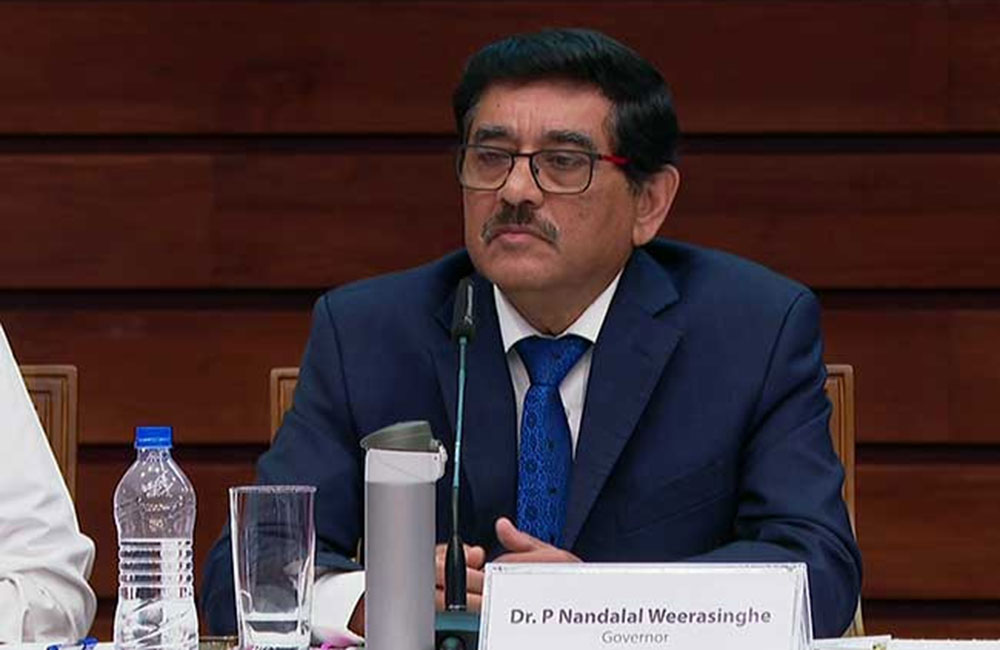
CBSL governor warns against any deviation from intended fiscal policy trajectory
The Governor of the Central Bank of Sri Lanka, Dr. Nandalal Weerasinghe, says any political or social uncertainties or reversals of hard earned achievements that exerts significant pressure on the economic reforms agenda could lead to a deviation from the intended policy trajectory.
He said this could potentially result in adverse and irreversible impacts on the economy and the recurrence of the economic and social crisis that Sri Lanka experience in the past two years.
He expressed these views while attending the 37th Annual Conference of the Organisation of Professional Associations of Sri Lanka held on Monday (26) at the Shangri-La Hotel in 5Colombo, under the theme of “Towards Sri Lanka’s Sustained Economic Growth”.
“As you all know the ongoing reform agenda comprises measures that are expected to augment the resilience and stability of the economy, which is what is needed for the medium-long-term growth”, he said.
The Central Bank Governor said maintaining macro-economic stability is a prerequisite to ensure sustained growth trajectory in the medium to long term.
He further said, although these reforms are painful in the short term, it is crucial for all stakeholders to remain committed and ensure the swift implementation of this long-overdue reforms to set the economy on the path towards sustain, inclusive and sustainable growth.
“Despite all such efforts any political or social uncertainties or reversals of hard earned achievements that exerts significant pressure on the reforms agenda could lead to a deviation from the intended policy trajectory, potentially resulting in adverse and irreversible impacts on the economy and recurrence of the economic and social crisis that we experience in the past two years”.
At the same time, policies of macroeconomic stability itself could not be sufficient to propel the economy to a high-growth path that would take Sri Lanka to an advanced country status within a short time, Dr. Weerasinghe said.
He stated that with the current sovereign debt crisis, the government does not have any physical space to drive the economic growth through higher spending or lower taxes as in the past since reinstating fiscal and debt sustainability is the need of the hour at present and also for the future.
(adaderana.lk)
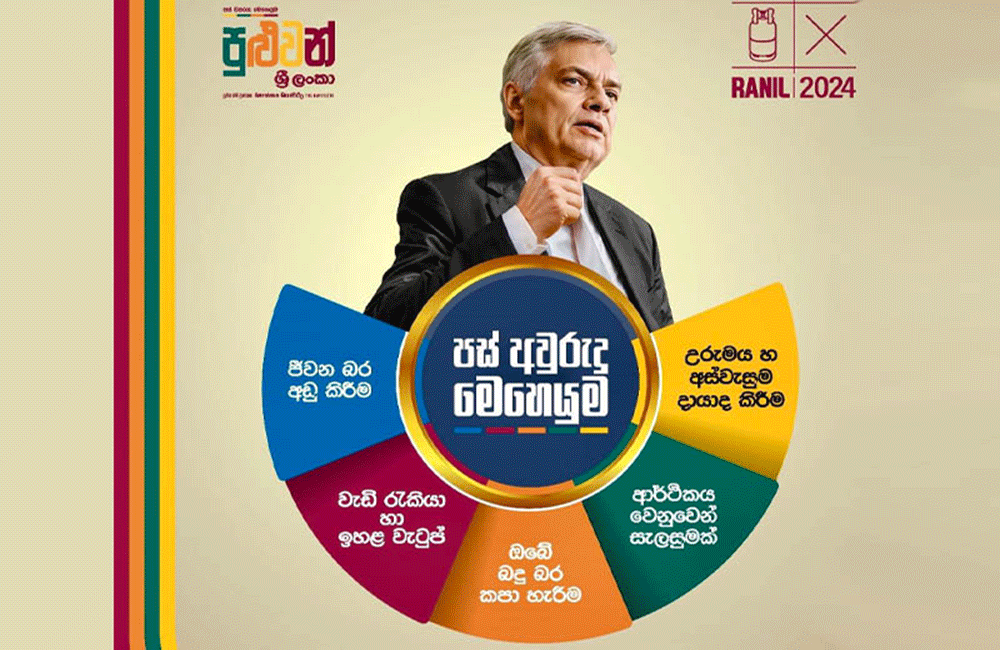
President Ranil’s election manifesto unveiled
President Ranil Wickremesinghe’s manifesto for the 2024 Presidential Election was officially launched in Colombo today (29).
The ceremonial event of unveiling the manifesto titled ‘Five Years of Winning the Country with Ranil’ commenced at the Taj Samudra Hotel with the arrival of President Ranil Wickremesinghe at the venue.
This document outlines five principal components: “Theravada Trade Economy,” “Operation - Beyond 2025,” “Make a Radiant Society,” “Win the Motherland,” and “Unite Sri Lanka.”
The ceremony is also attended by Prime Minister Dinesh Gunawardena, Ministers Ali Sabry, Bandula Gunawardena, Nimal Siripala de Silva, and other ministers, parliamentarians and political leaders supporting the President as well as religious leaders.
In a post on his official social media accounts this morning, the President said: “Today, I lay out my manifesto to rebuild our country. I promise only what I can deliver, and I will do my best for our nation in the next five years. I will rebuild this country, and the next five years will be a triumphant time for Sri Lanka.”
The website www.ranil2024.lk, which features the manifesto of President Ranil Wickremesinghe who is running as an independent candidate in the upcoming presidential election, was also launched during the ceremony today.
In his policy statement, President Wickremesinghe outlines the priorities of the five-year plan: easing the cost of living, creating jobs, offering tax relief, promoting economic growth and implementing the ‘Aswesuma’ and ‘Urumaya’ programs.
As the first step, 100,000 new sources of employment will be created, thereby expanding the job market. Additionally, the manifesto mentioned that new income generation opportunities will be developed.
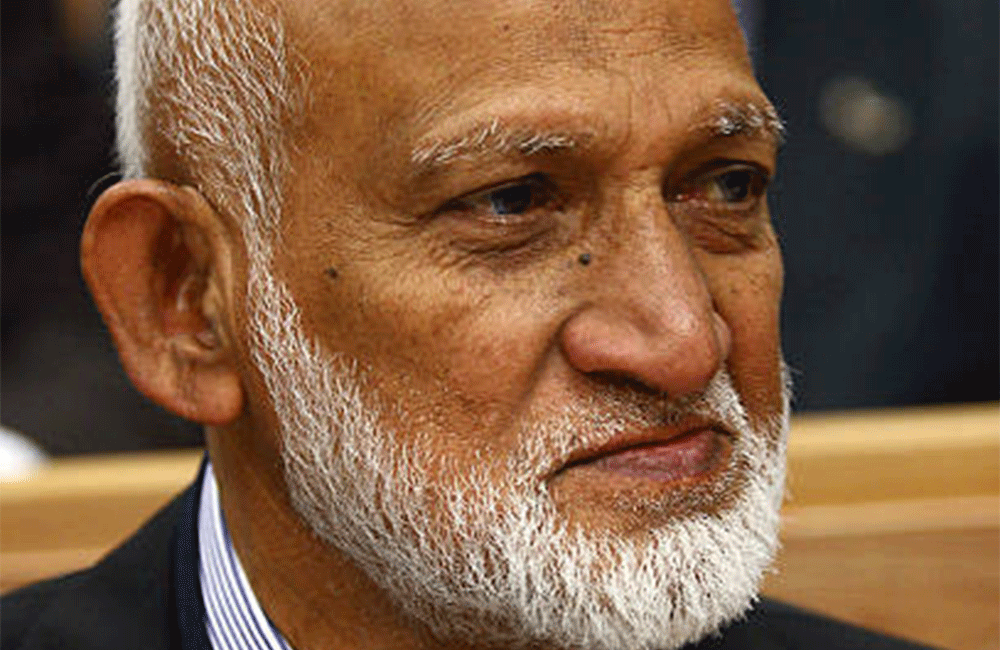
Fowzie Given Suspended Sentence for Misuse of Government Vehicle
The Colombo High Court sentenced former minister A.H.M. Fowzie to two years of hard labor after he pleaded guilty to misusing a government vehicle.
However, Justice Navaratne Marasinghe suspended the sentence for ten years.
The court also imposed a fine of 400,000 rupees on Fowzie.
The charges stemmed from allegations that he used a jeep, donated by the Dutch government to the Disaster Management Center, for personal purposes. Additionally, he was accused of spending nearly 1,000,000 rupees on the vehicle's maintenance.
The case, brought forward by the Bribery Commission, included four charges related to the misuse of the vehicle.
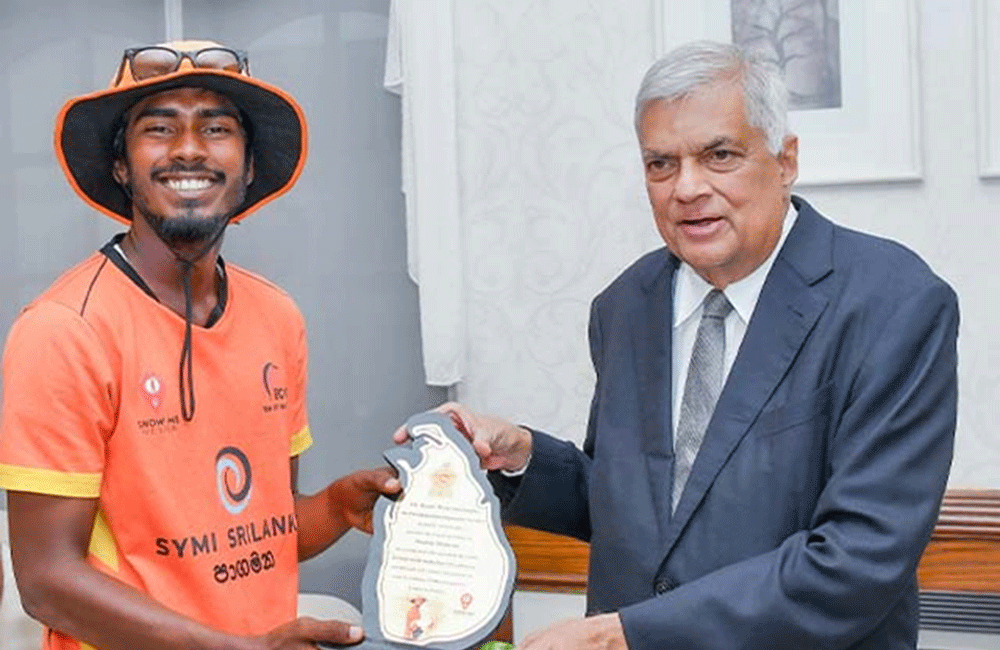
President Ranil Wickremesinghe Meets Record-Breaking Traveller Shahmy Shaheed
Shahmy Shaheed, a young man from Beruwala who made headlines by walking 1,500 kilometers around Sri Lanka in just 45 days, was honoured yesterday (28) by President Ranil Wickremesinghe at the President’s official residence in Colombo.
Shahmy’s remarkable journey began in his hometown of Beruwala, taking him through a series of major cities and picturesque locations across the island, including Ambalangoda, Ranna, Mirissa, Hambantota, Wellawaya, Monaragala, Siyambalanduwa, Pottuvil, Nilaveli, Mulathivu, Paranthan, Point Pedro, Chunnakkam, Mannar, Medawachchiya, Anuradhapura, Puttalam, Marawila, Negombo and Colombo, before concluding in Beruwala. His trek aimed to showcase the peace and safety of Sri Lanka, encouraging both locals and foreigners to explore the country without hesitation.
Throughout his journey, Shahmy leveraged social media to share his experiences, effectively promoting lesser-known tourist spots and drawing attention to Sri Lanka’s rich cultural and natural heritage. His efforts have not only highlighted the country’s beauty but also provided a significant boost to its tourism industry.
During their meeting, President Wickremesinghe commended Shahmy for his dedication and the positive impact of his journey. The President presented Shahmy with a special commemorative gift and expressed his intention to involve Shahmy in future initiatives aimed at further enhancing Sri Lanka’s tourism sector.
Shahmy’s achievement serves as an inspiring example of how individual efforts can contribute to national pride and economic growth, particularly in the tourism industry.
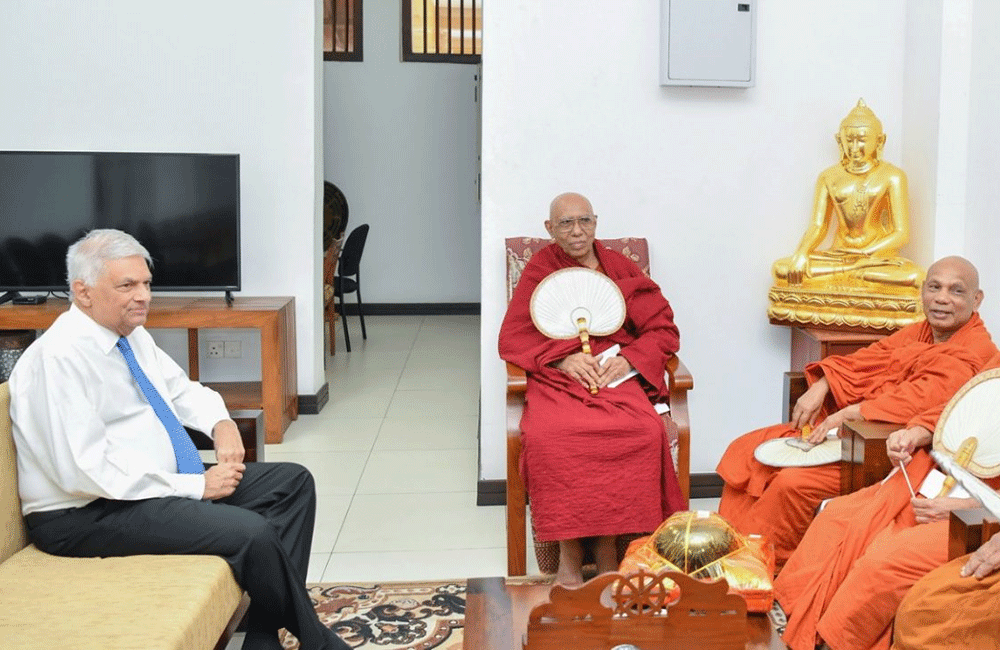
President calls on Chief Prelate of the Ramanna Sect
President Ranil Wickremesinghe visited the Sri Lanka Ramanna Sect in Narahenpita this morning (27), where he met with the Mahanayake of the Ramanna Sect Aggamaha Panditha Most Ven. Makulawe Wimala Thero, and received blessings.
The President engaged in a brief discussion with the Maha Sangha of the Ramanna Sect led by the Mahanayake and he updated the Maha Sangha on the country's economic recovery and outlined future plans.
Additionally, President Wickremesinghe addressed issues related to education, land concerns in sacred areas, and also briefed the discussions held with Tamil MPs concerning the development of the Northern and Eastern Provinces.
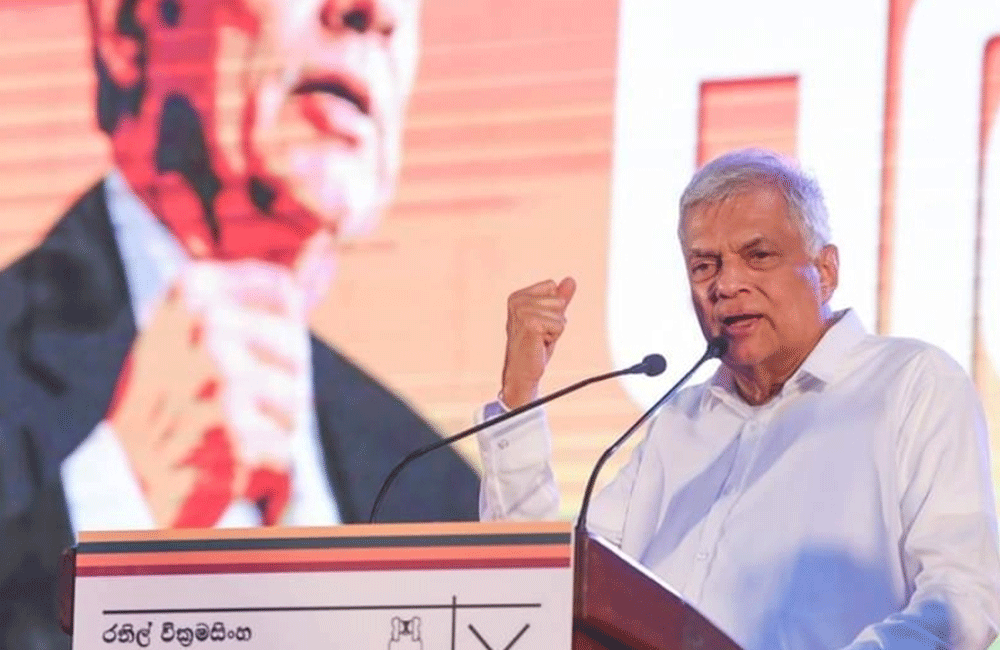
Reducing PAYE tax : President reveals discussion with IMF
President Ranil Wickremesinghe announced that the government has reached an agreement with the International Monetary Fund (IMF) to revise the Pay As You Earn (PAYE) tax, a significant concern for the public. He assured that following further discussions, relief measures would be implemented as soon as possible.
The President made these remarks while addressing the “Puluwan Sri Lanka” victory rally held near the new market in Eheliyagoda this afternoon (28).
The rally, organized to affirm President Wickremesinghe’s candidacy in the upcoming presidential election, saw a large turnout from the Eheliyagoda area. During his speech,the President emphasized the government’s awareness of the challenges faced by the citizens and stressed the importance of providing relief while safeguarding the country’s economy. He warned that if the economy were to collapse, there would be no country left for people to live in.
Furthermore, the President criticized Sajith Premadasa and Anura Kumara Dissanayake for making unrealistic promises about reducing taxes and easing the people’s burdens.
He cautioned that following their proposed path could lead to severe shortages, leaving the public once again without essential supplies such as gas, fuel, and medicine.
“Currently, income tax has become a significant issue. We have reached an agreement with the International Monetary Fund (IMF) on the need to revise it, and I can confirm that a basic decision has already been made. Both parties have submitted proposals, and once we have discussed and agreed on a common approach, we will be able to provide relief to the public” President said.
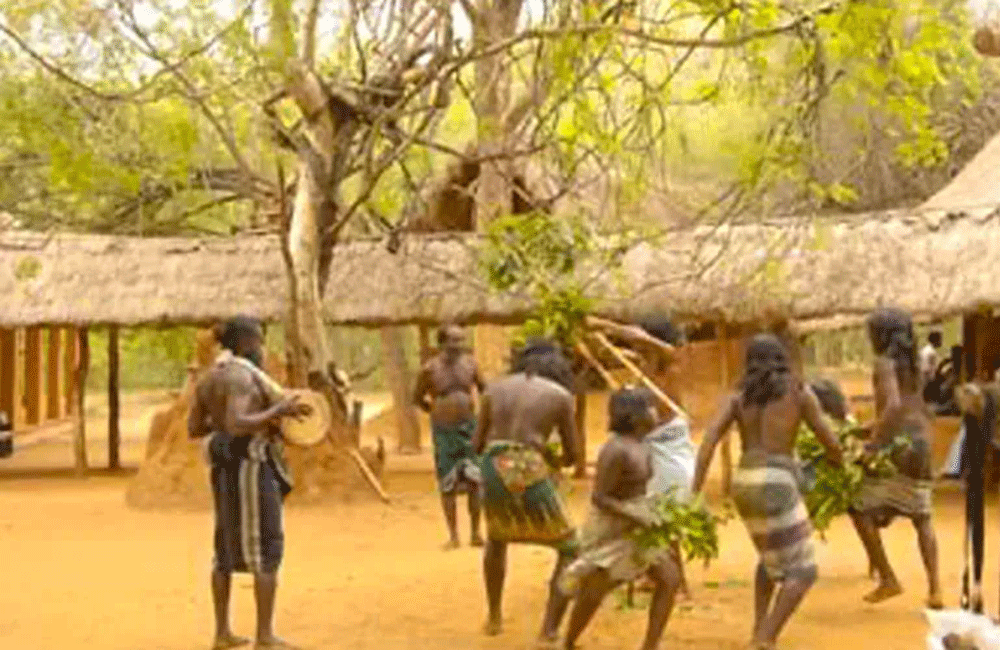
Sri Lanka to introduce new law for Indigenous Community
Cabinet approval has been granted to prepare a draft bill introducing a new law concerning the rights of the indigenous community in Sri Lanka.
Approval of the Cabinet of Ministers was granted in May 2024 to the joint proposal by the then Minister of Justice, Prison Affairs and Constitutional Reforms and the Minister of Buddha Sasana, Religious and Cultural Affairs concerning the introduction of the new law.
At that meeting, it was decided to further analyze the concept paper presented to prepare the draft bill with the participation of all parties concerned.
Accordingly, the relevant fundamental draft bill was further improved subsequent to several rounds of discussions with the participation of officers in the Ministries of Lands, Wildlife and Forest Conservation, Environment, and Finance, the Attorney General’s Department, the Department of the Legal Draftsman, and stakeholders interested in the relevant sector headed by the Secretary to the Prime Minister.
Based on the discussions, the Cabinet approved the joint proposal, instructing the Legal Draftsman to prepare a draft bill based on the aforementioned fundamental draft.
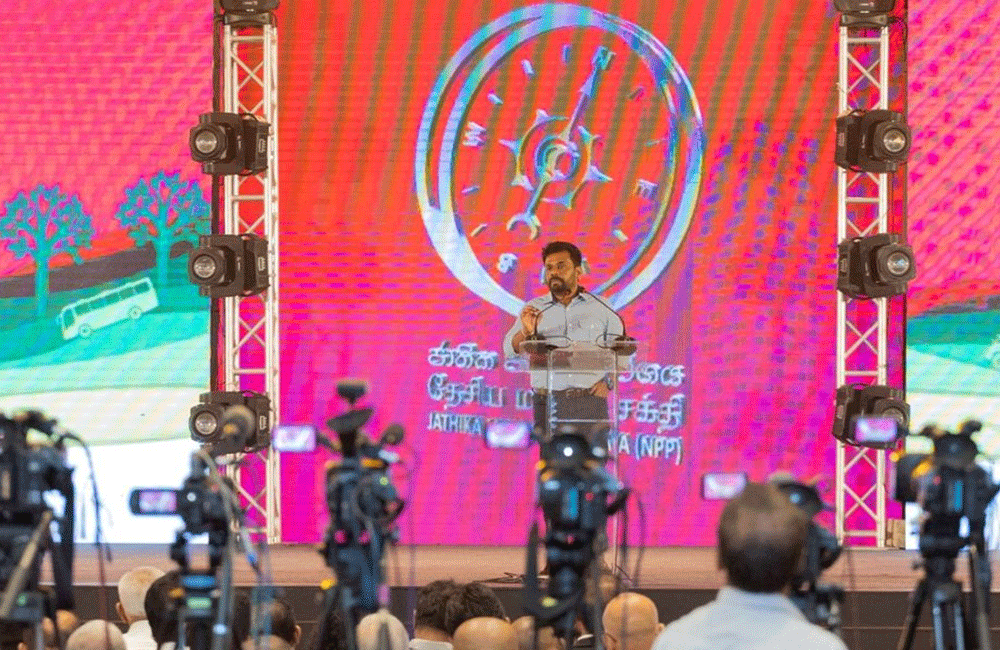
AKD Pushes For Knowledge-Centric Economy in Sri Lanka
Anura Dissanayake, the presidential candidate of the National People's Power, has emphasized the importance of establishing a knowledge-centric economy as a primary objective of his government.
Dissanayake highlighted the potential of Sri Lanka's vast maritime resources, drawing comparisons to India's advanced methods of fish resource management.
He described how Indian fishermen receive real-time updates on fish populations via mobile notifications, allowing them to optimize their catch efficiently. He proposed similar technological advancements for Sri Lankan fisheries, suggesting the use of chips and computer systems to monitor and manage marine ecosystems.
He also stressed the importance of integrating technology and science into various industries to enhance productivity and sustainability. Dissanayake pointed out that Sri Lanka's human resources, enriched by a long history of organized education dating back to the arrival of Mihindu Maha Rahath Thero and Buddhism, are well-positioned to support a knowledge-based economy.
Dissanayake cited the success of India's IT industry, which generated $253 million last year, as an example of how a focus on creativity and intellectual capital can yield significant economic benefits. He argued that unlike traditional industries reliant on raw materials, the IT sector thrives on innovation and the creative mind, offering greater value and growth potential.
Dissanayake called for a shift towards a knowledge-centric economy, emphasizing that the future of global progress lies in new creativity and knowledge-based advancements.
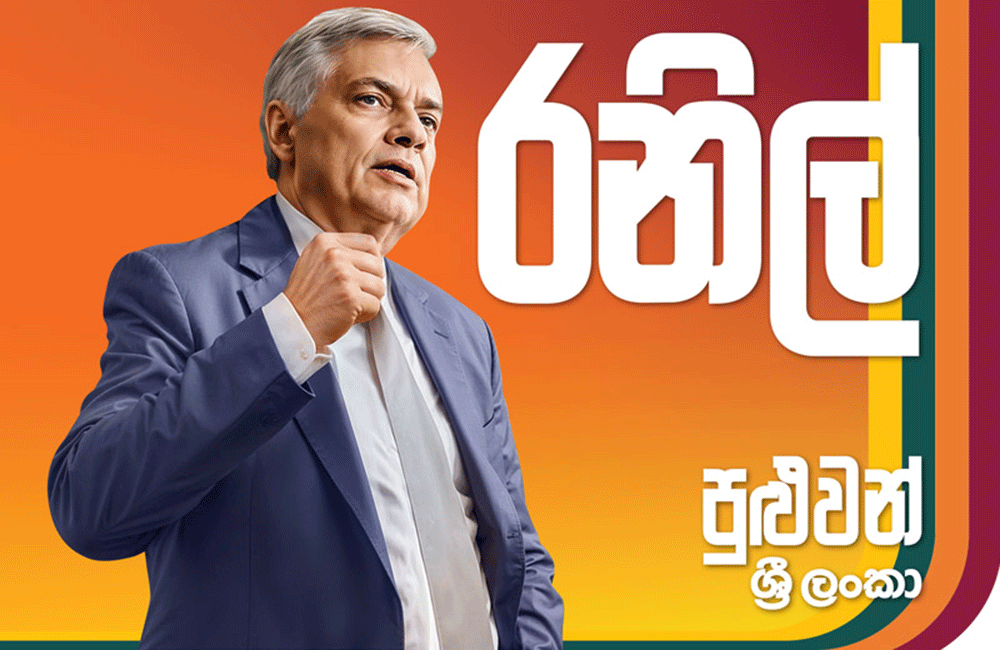
‘Puluvan Sri Lanka’: Ranil’s official theme song released
Incumbent Ranil Wickremesinghe, who contests the presidential election as an independent candidate, has released his official theme song, ‘Puluvan Sri Lanka’.
It is now available on social media.
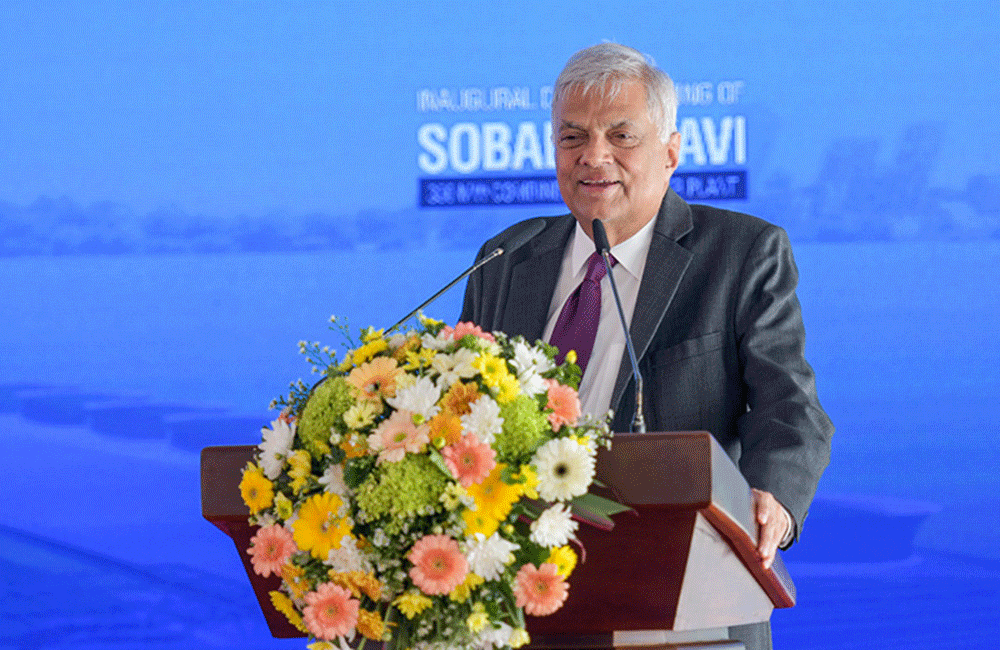
‘Sobadhanavi’ LNG power plant declared open
The Open Cycle phase of the Sobadhanavi 350 MW Liquefied Natural Gas (LNG) Combined Cycle Power Plant at Kerawalapitiya was declared open today.
Marking a significant milestone in Sri Lanka’s energy future, the power plant was declared open by President Ranil Wickremesinghe.
According to the President’s Media Division (PMD), the “Sobadhanavi” Power Plant is the first Sri Lankan power plant to be operated on LNG as the primary fuel.
Recently, a memorandum of understanding (MoU) was also signed to develop infrastructure for the storage, regasification, and supply of liquefied natural gas (LNG) for the Sobadhanavi Combined Cycle Power Plant.
The agreement was finalized between Sri Lanka’s LTL Holdings Limited and India’s Petronet LNG Limited.
The agreement was inked by Minister of Power and Energy Kanchana Wijesekara and Deputy High Commissioner of India in Sri Lanka Dr. Satyanjal Pandey.
The 350 MW LNG-based Combined Cycle Power Plant, ‘Sobadhanavi,’ is a landmark project poised to become the largest independent power producer (IPP) in Sri Lanka and the first to operate with LNG.
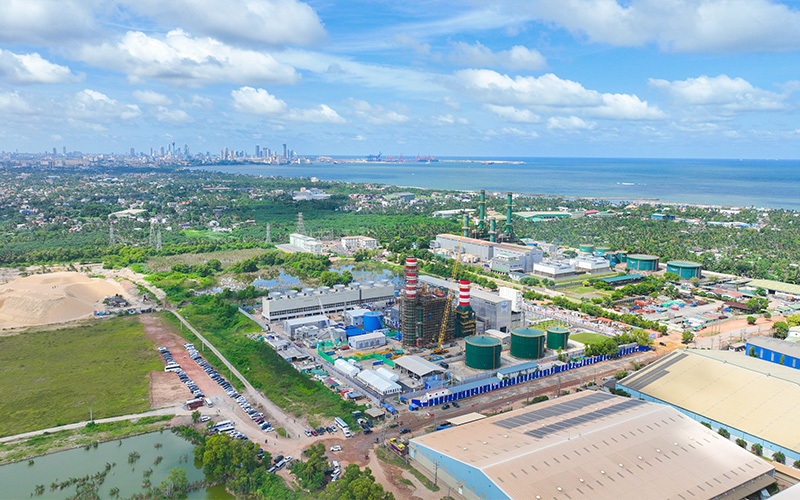
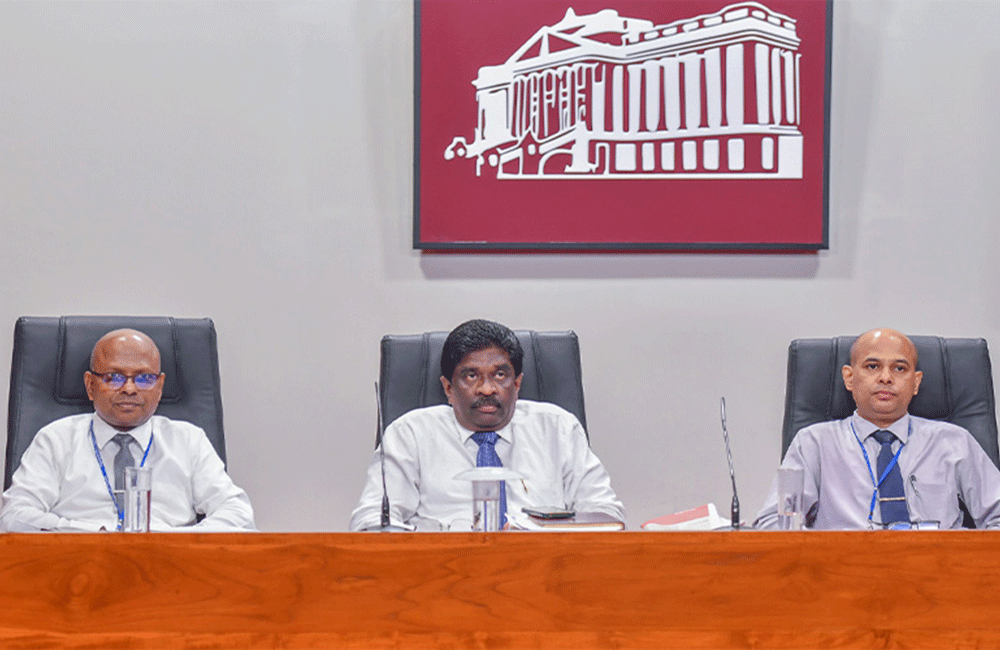
Claims of Large Outstanding Taxes Are an Illusion
Commissioner General of the Excise Department M.J. Gunasiri dismissed claims of significant arrears in three major government revenue sources—namely the Inland Revenue Department, Sri Lanka Customs, and the Excise Department—as myths.
Speaking at the press briefing titled “Collective Path to a Stable Country” held at the Presidential Media Centre (PMC), today (26), he clarified that the outstanding tax amount for these three institutions totals only Rs.90 billion. He also noted that it is typical for any country to have 3%-5% of its total tax revenue in outstanding taxes.
Commissioner General Gunasiri further highlighted that these three institutions achieved record revenue in 2023, surpassing Rs.3 trillion. Additionally, after 25 years, they succeeded in creating a surplus in the primary account.
Addressing the media personnel, Commissioner General of Excise further explained;
The three institutions under the Ministry of Finance—the Inland Revenue Department, Sri Lanka Customs, and the Excise Department—work within a legal framework to collect state revenue. Despite some groups spreading misinformation about large tax arrears, the actual total unpaid taxes for these institutions are under Rs.90 billion. Most of these arrears are from government entities, and legal actions are underway to recover the funds, meaning these amounts should be considered deferred taxes. Once the judicial process is completed, recovery is possible. Additionally, a tax deficit of 3%-5% of total tax revenue is typical for any country. Nevertheless, overall state tax revenue has seen a significant increase over the past two years.
In 2023, the Inland Revenue Department, Sri Lanka Customs Department, and Excise Department collectively achieved the highest revenue in history, surpassing Rs.3 trillion. Notably, after 25 years, they managed to create a surplus in the primary account.
Focusing on the Excise Department, it generated an income of Rs.179 billion in 2023, with a target set at Rs.232 billion for 2024. By August 22, 2023, the department had earned Rs.106.5 billion, whereas by August 2024, it had earned Rs.132.7 billion. This represents a growth of 24.6% compared to the previous year.
The Excise Department generates revenue through license fees: Rs. 15 million for a municipal council, Rs. 12.5 million for another municipal council, and Rs. 10 million for a Pradeshiya Sabha. Licenses for manufacturing plants are set at Rs. 25 million each. As of August 20 this year, the department has earned Rs. 132.4 billion. In 2023, the department had an outstanding tax amount of Rs. 1.04 billion, with Rs. 609 million collected by February of this year. The remaining tax arrears are currently under court proceedings.
Deputy Commissioner General (Tax Policy, International Affairs and Legal) of the Inland Revenue Department B.K.S. Shantha;
With the country’s recovery, tax revenue targets were surpassed last year. The Inland Revenue Department’s revenue target for 2024 is set at Rs.2, 024 billion, with plans to collect 40% of this amount in the first four months and the remaining 60% over the last six months.
To enhance efficiency, a Risk Management Unit has been established to streamline the tax revenue process. Currently, Rs.1, 066 billion in tax revenue is suspended due to on-going court cases. The department also had Rs.188 billion in tax arrears, of which Rs.104 billion are being recovered thanks to the dedicated efforts of the Excise Department’s employees. The remaining Rs.84 billion in outstanding taxes are in the process of being recovered through legal actions.
The Inland Revenue Department had Rs.188 billion in tax arrears, of which Rs.104 billion are being recovered thanks to the dedication of the Excise Department’s employees. Another Rs.84 billion in outstanding taxes remains, and the necessary legal processes to recover this amount have already been initiated.
In 2023, the number of tax files increased from 450,000 to 1.15 million. Additionally, 4.7 million new TIN numbers were issued this year.
Recently, social media has been spreading rumours that Inland Revenue Department officers are visiting institutions in disguise to collect taxes. However, department officials do not visit institutions to collect taxes; they only go for awareness purposes. Therefore, it is important to note that no one should give money to individuals claiming to be tax collectors in disguise. The police have been alerted to investigate any complaints related to this issue, and security forces have been notified.
Finance Officer of Sri Lanka Customs Department, Anura Muthukude;
The Sri Lanka Customs Department is expected to generate Rs.1, 533 billion in revenue for 2024. By August 25 this year, the department had already collected Rs.963.7 billion. Media reports indicate that the department has Rs.58.6 billion in outstanding taxes, with Rs.57.6 billion owed by government institutions, effectively rendering that amount non-recoverable. The department has taken legal steps to recover the remaining taxes, some of which have been pending for over a decade.
To enhance transparency, the Sri Lanka Customs Department has established a new “Smat Unit,” where the public can submit complaints. It is important to note that despite a workforce shortage of 940 employees, the department’s staffs have ensured that no tax revenue has been evaded.
Page 34 of 530